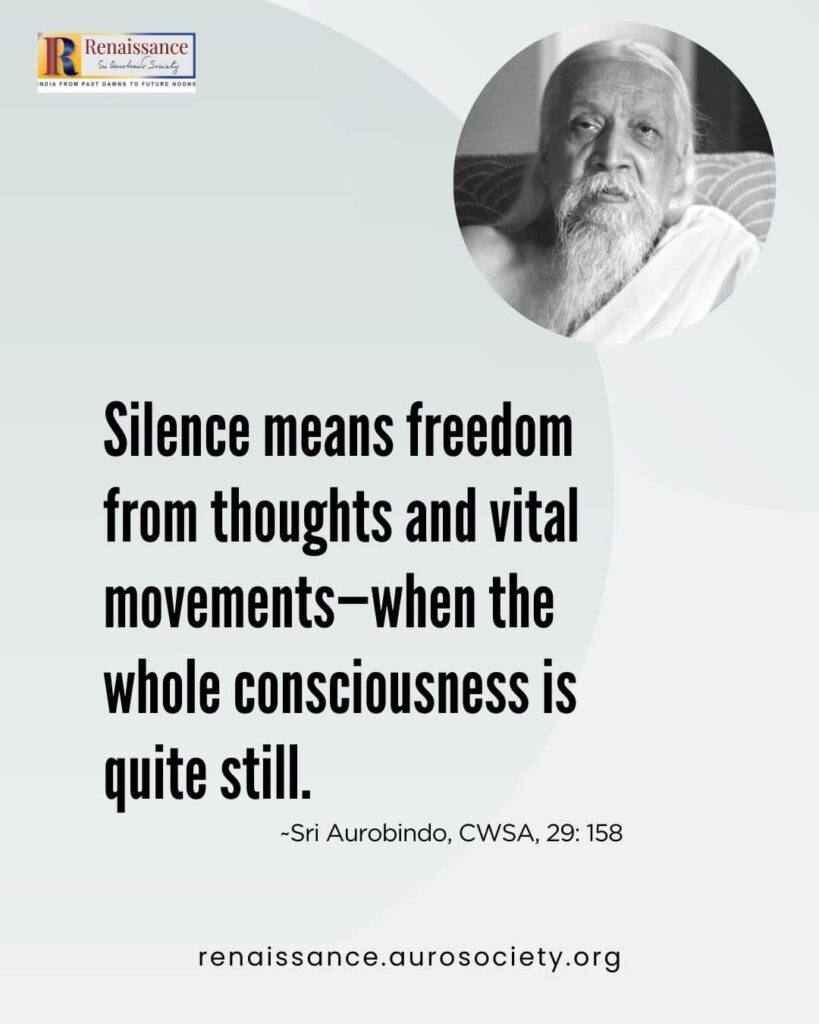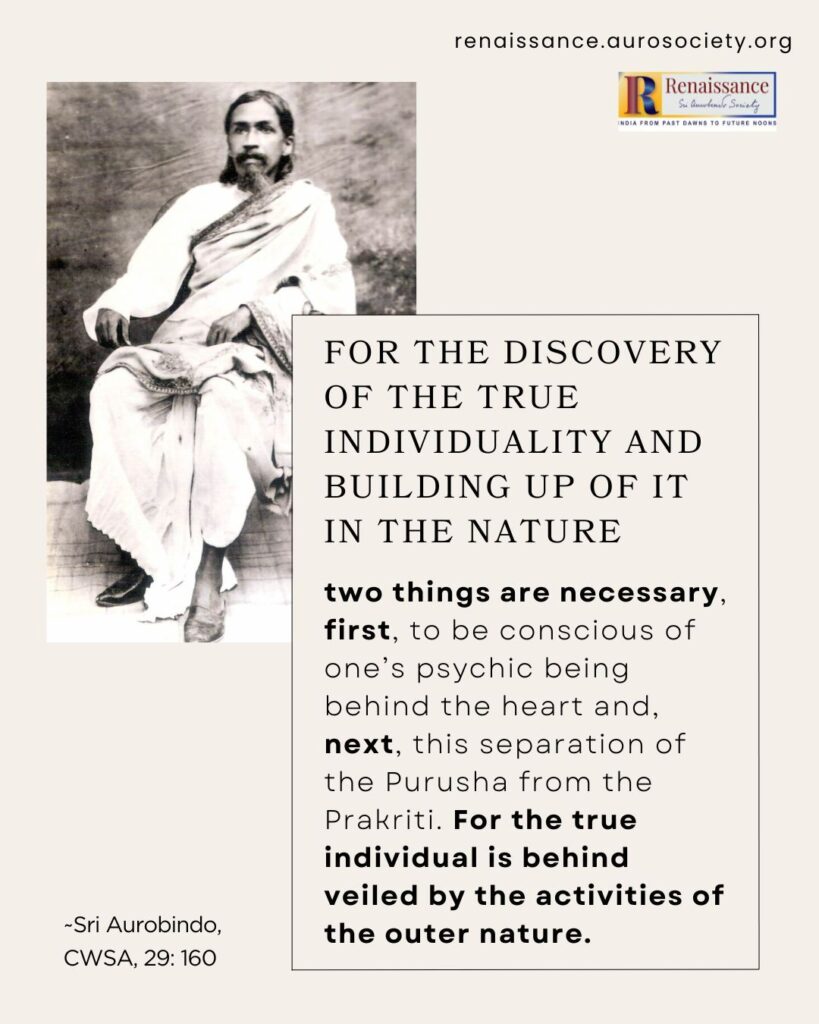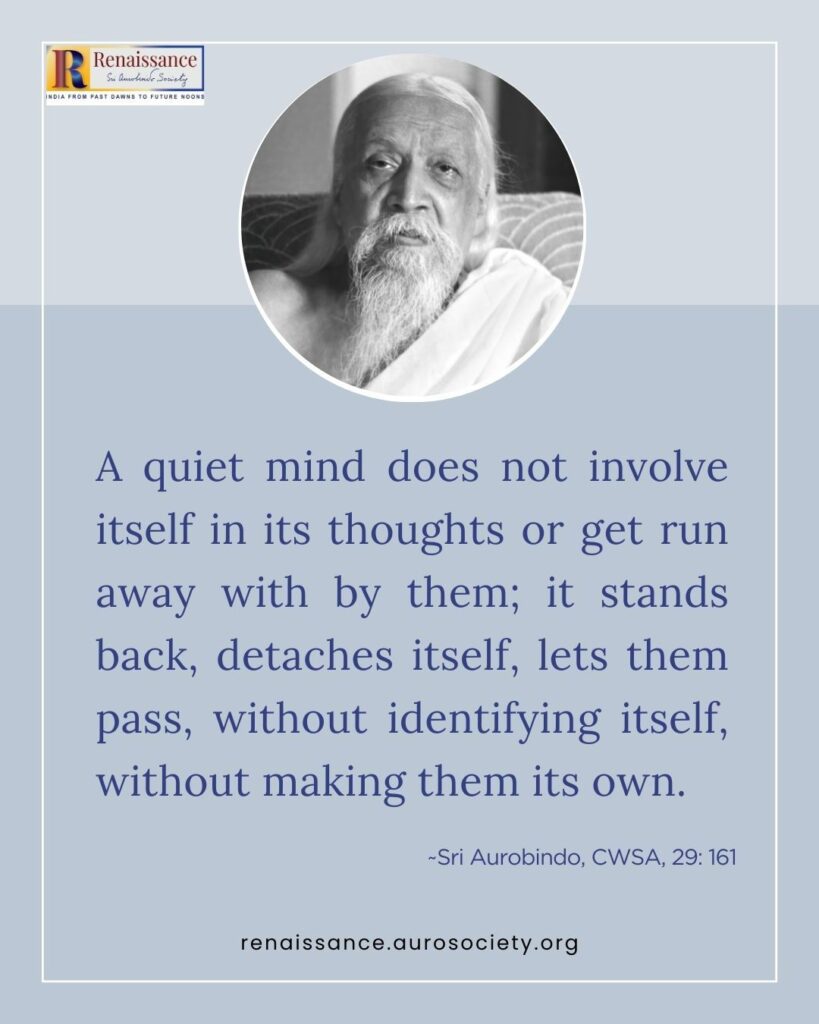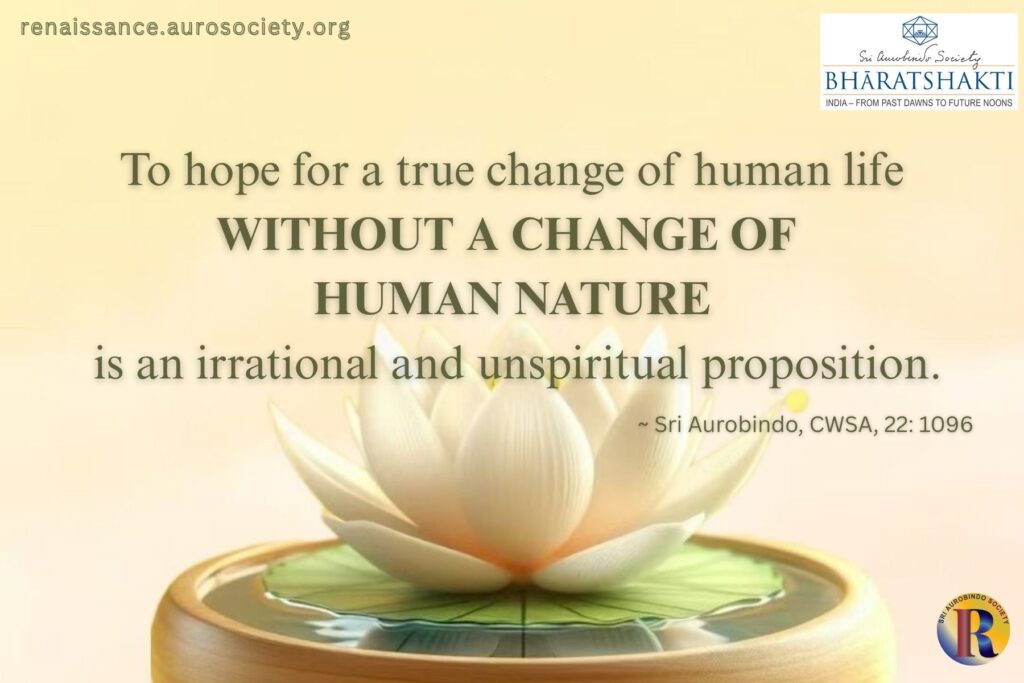Volume V, Issue 5
Author: Sri Aurobindo
Editor’s Note: We highlight a few letters of Sri Aurobindo which emphasize the profound necessity of silencing the mind. He explains that acquiring a silent mind is not easy, and gives some practical guidance in this regard. We have made a few minor formatting revisions for the purpose of this digital presentation, with no change in the text.


Comments on a Yogi’s words, referred to by a disciple
“In Silence is wisdom”—it is in the inner silence of the mind that true knowledge can come; for the ordinary activity of the mind only creates surface ideas and representations which are not true knowledge. Speech is usually only the expression of the superficial nature—therefore to throw oneself out too much in such speech wastes the energy and prevents the inward listening which brings the word of true knowledge.
“In listening you will win what you are thinking of” means probably that in the silence will come the true dynamic thought formations which can effectuate or realise themselves. Thought can be a force which realises itself, but the ordinary surface thinking is not of that kind, there is in it more waste of energy than anything else. It is in the thought that comes in a quiet or silent mind that there is power.
“Talk less and gain power” has essentially the same meaning. Not only a truer knowledge, but a greater power comes to one in the quietude and silence of a mind that instead of bubbling on the surface can go into its own depths and listen for what comes from a higher consciousness.
It is probably this that is meant—these are things known to all who have some experience of Yoga.
~ Sri Aurobindo, CWSA, Vol. 29, p. 159
Establishing a Deep Silence
It is not possible to establish a deep silence all at once unless you can separate yourself from the thoughts, feel them as coming from outside and reject them before they enter. But everybody cannot do that at once.
***
It is quite possible for thoughts to pass without disturbing the silence—but for that you must be perfectly detached from the thoughts and indifferent to them.
***
If there is absolute silence within it is quite natural that the thoughts on entering and touching it should fall off. It is the way in which silence of the outer mind usually comes.

To get rid of the random thoughts of the surface physical mind is not easy.
It is sometimes done by a sudden miracle as in my own case, but that is rare. Some get it done by a slow process of concentration, but that may take a very long time.
It is easier to have a quiet mind with things that come in passing on the surface, as people pass in the street, and one is free to attend to them or not—that is to say, there develops a sort of double mind, one inner silent and concentrated when it pleases to be so, a quiet witness when it chooses to see thoughts and things,—the other meant for surface dynamism.
~ 16 November 1932
~ CWSA, Vol. 35, pp. 245-246
Silence and Quietness of Mind
Silence is a state of the consciousness which comes of itself from above when you open to the Divine Consciousness—you need not trouble about that now.
A quiet mind, receiving things and looking at them without effervescence or haste, not rushing about or throwing up random ideas, is what is necessary.
***
It is not an undesirable thing for the mind to fall silent, to be free from thoughts and still—for it is oftenest when the mind falls silent that there is the full descent of a wide peace from above and in that wide tranquility the realisation of the silent Self above the mind spread out in its vastnesses everywhere.
Only, when there is the peace and the mental silence, the vital mind tries to rush in and occupy the place or else the mechanical mind tries to raise up for the same purpose its round of trivial habitual thoughts.
What the sadhaka has to do is to be careful to reject and hush these outsiders, so that during the meditation at least the peace and quietude of the mind and vital may be complete.
This can be done best if you keep a strong and silent will.
That will is the will of the Purusha behind the mind; when the mind is at peace, when it is silent one can become aware of the Purusha, silent also, separate from the action of the nature.
To be calm, steady, fixed in the spirit, dhīra, sthira, this quietude of the mind, this separation of the inner Purusha from the outer Prakriti is very helpful, almost indispensable. So long as the being is subject to the whirl of thoughts or the turmoil of the vital movements one cannot be thus calm and fixed in the spirit. To detach oneself, to stand back from them, to feel them separate from oneself is indispensable.
For the discovery of the true individuality and building up of it in the nature, two things are necessary, first, to be conscious of one’s psychic being behind the heart and, next, this separation of the Purusha from the Prakriti. For the true individual is behind veiled by the activities of the outer nature.

***
Silence is always good; but I do not mean by quietness of mind entire silence.
I mean a mind free from disturbance and trouble, steady, light and glad so as to be open to the Force that will change the nature.
The important thing is to get rid of the habit of the invasion of troubling thoughts, wrong feelings, confusion of ideas, unhappy movements. These disturb the nature and cloud it and make it more difficult for the Force to work; when the mind is quiet and at peace, the Force can work more easily.
It should be possible to see things that have to be changed in you without being upset or depressed; the change is the more easily done.
***
Quiet Mind and Mental Activity
Let us not exaggerate anything. It is not so much getting rid of mental activity as converting it into the right thing.
Krishnaprem has mental activity, but it is a mind that has gone inside and sees things from there, an intuitive mind; I have mental activity (in the midst of silence) whenever necessary, but it is a mind that has gone up and sees things from above, an overmind action.
What has to be surpassed and changed is the intellectual reason which sees things from outside only by analysis and inference—when it does not do it rather by taking a hasty look and saying “So it is” or “So it is not”. But you can’t get the inner or upper mind unless the old mental activity becomes a little quiet.
A quiet mind does not involve itself in its thoughts or get run away with by them; it stands back, detaches itself, lets them pass, without identifying itself, without making them its own. It becomes the witness mind watching the thoughts when necessary, but able to turn away from them and receive from within and from above.

Silence is good, but absolute silence is not indispensable, at least at this stage.
I do not know that to wrestle with the mind to make it quiet is of much use; usually the mind gets the better of that game. It is this standing back, detaching oneself, getting the power to listen to something else other than the thoughts of the external mind that is the easier way.
At the same time one can look up, as it were, imaging to oneself the Force as there just above and calling it down or quietly expecting its help. That is how most people do it till the mind falls gradually quiet or silent of itself or else silence begins to descend from above.
But it is important not to allow the depression or despair to come in because there is no immediate success; that can only make things difficult and stop any progress that is preparing.
~ Design: Beloo Mehra



